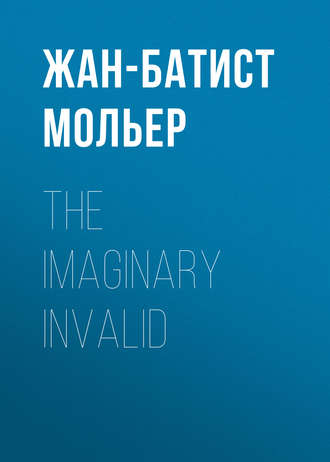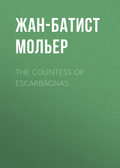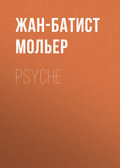
Мольер (Жан-Батист Поклен)
The Imaginary Invalid
ACT III
SCENE I. – BÉRALDE, ARGAN, TOINETTE
Ber. Well, brother, what do you say to that? Isn't it as good as a dose of cassia?
Toi. Oh! good cassia is a very good thing, Sir.
Ber. Now, shall we have a little chat together.
Arg. Wait a moment, brother, I'll be back directly.
Toi. Here, Sir; you forget that you cannot get about without a stick.
Arg. Ay, to be sure.
SCENE II. – BÉRALDE, TOINETTE
Toi. Pray, do not give up the interest of your niece.
Ber. No, I shall do all in my power to forward her wishes.
Toi. We must prevent this foolish marriage which he has got into his head, from taking place. And I thought to myself that it would be a good thing to introduce a doctor here, having a full understanding of our wishes, to disgust him with his Mr. Purgon, and abuse his mode of treating him. But as we have nobody to act that part for us, I have decided upon playing him a trick of my own.
Ber. In what way?
Toi. It is rather an absurd idea, and it may be more fortunate than good. But act your own part. Here is our man.
SCENE III. – ARGAN, BÉRALDE
Ber. Let me ask you, brother, above all things not to excite yourself during our conversation.
Arg. I agree.
Ber. To answer without anger to anything I may mention.
Arg. Very well.
Ber. And to reason together upon the business I want to discuss with you without any irritation.
Arg. Dear me! Yes. What a preamble!
Ber. How is it, brother, that, with all the wealth you possess, and with only one daughter – for I do not count the little one – you speak of sending her to a convent?
Arg. How is it, brother, that I am master of my family, and that I can do all I think fit?
Ber. Your wife doesn't fail to advise you to get rid, in that way, of your two daughters; and I have no doubt that, through a spirit of charity, she would be charmed to see them both good nuns.
Arg. Oh, I see! My poor wife again! It is she who does all the harm, and everybody is against her.
Ber. No, brother; let us leave that alone. She is a woman with the best intentions in the world for the good of your family, and is free from all interested motives. She expresses for you the most extraordinary tenderness, and shows towards your children an inconceivable goodness. No, don't let us speak of her, but only of your daughter. What can be your reason for wishing to give her in marriage to the sort of a doctor?
Arg. My reason is that I wish to have a son-in-law who will suit my wants.
Ber. But it is not what your daughter requires, and we have a more suitable match for her.
Arg. Yes; but this one is more suitable for me.
Ber. But does she marry a husband for herself or for you, brother?
Arg. He must do both for her and for me, brother; and I wish to take into my family people of whom I have need.
Ber. So that, if your little girl were old enough, you would give her to an apothecary?
Arg. Why not?
Ber. Is it possible that you should always be so infatuated with your apothecaries and doctors, and be so determined to be ill, in spite of men and nature?
Arg. What do you mean by that, brother?
Ber. I mean, brother, that I know of no man less sick than you, and that I should be quite satisfied with a constitution no worse than yours. One great proof that you are well, and that you have a body perfectly well made, is that with all the pains you have taken, you have failed as yet in injuring the soundness of your constitution, and that you have not died of all the medicine they have made you swallow.
Arg. But are you aware, brother, that it is these medicines which keep me in good health? Mr. Purgon says that I should go off if he were but three days without taking care of me.
Ber. If you are not careful, he will take such care of you that he will soon send you into the next world.
Arg. But let us reason together, brother; don't you believe at all in medicine?
Ber. No, brother; and I do not see that it is necessary for our salvation to believe in it.
Arg. What! Do you not hold true a thing acknowledged by everybody, and revered throughout all ages?
Ber. Between ourselves, far from thinking it true, I look upon it as one of the greatest follies which exist among men; and to consider things from a philosophical point of view, I don't know of a more absurd piece of mummery, of anything more ridiculous, than a man who takes upon himself to cure another man.
Arg. Why will you not believe that a man can cure another?
Ber. For the simple reason, brother, that the springs of our machines are mysteries about which men are as yet completely in the dark, and nature has put too thick a veil before our eyes for us to know anything about it.
Arg. Then, according to you, the doctors know nothing at all.
Ber. Oh yes, brother. Most of them have some knowledge of the best classics, can talk fine Latin, can give a Greek name to every disease, can define and distinguish them; but as to curing these diseases, that's out of the question.
Arg. Still, you must agree to this, that doctors know more than others.
Ber. They know, brother, what I have told you; and that does not effect many cures. All the excellency of their art consists in pompous gibberish, in a specious babbling, which gives you words instead of reasons, and promises instead Of results.
Arg. Still, brother, there exist men as wise and clever as you, and we see that in cases of illness every one has recourse to the doctor.
Ber. It is a proof of human weakness, and not of the truth of their art.
Arg. Still, doctors must believe in their art, since they make use of it for themselves.
Ber. It is because some of them share the popular error by which they themselves profit, while others profit by it without sharing it. Your Mr. Purgon has no wish to deceive; he is a thorough doctor from head to foot, a man who believes in his rules more than in all the demonstrations of mathematics, and who would think it a crime to question them. He sees nothing obscure in physic, nothing doubtful, nothing difficult, and through an impetuous prepossession, an obstinate confidence, a coarse common sense and reason, orders right and left purgatives and bleedings, and hesitates at nothing. We must bear him no ill-will for the harm he does us; it is with the best intentions in the world that he will send you into the next world, and in killing you he will do no more than he has done to his wife and children, and than he would do to himself, if need be. 4
Arg. It is because you have a spite against him. But let us come to the point. What is to be done when one is ill?
Ber. Nothing, brother.
Arg. Nothing?
Ber. Nothing. Only rest. Nature, when we leave her free, will herself gently recover from the disorder into which she has fallen. It is our anxiety, our impatience, which does the mischief, and most men die of their remedies, and not of their diseases.
Arg. Still you must acknowledge, brother, that we can in certain things help nature.
Ber. Alas! brother; these are pure fancies, with which we deceive ourselves. At all times, there have crept among men brilliant fancies in which we believe, because they flatter us, and because it would be well if they were true. When a doctor speaks to us of assisting, succouring nature, of removing what is injurious to it, of giving it what it is defective in, of restoring it, and giving back to it the full exercise of its functions, when he speaks of purifying the blood, of refreshing the bowels and the brain, of correcting the spleen, of rebuilding the lungs, of renovating the liver, of fortifying the heart, of re-establishing and keeping up the natural heat, and of possessing secrets wherewith to lengthen life of many years – he repeats to you the romance of physic. But when you test the truth of what he has promised to you, you find that it all ends in nothing; it is like those beautiful dreams which only leave you in the morning the regret of having believed in them.
Arg. Which means that all the knowledge of the world is contained in your brain, and that you think you know more than all the great doctors of our age put together.
Ber. When you weigh words and actions, your great doctors are two different kinds of people. Listen to their talk, they are the cleverest people in the world; see them at work, and they are the most ignorant.
Arg. Heyday! You are a great doctor, I see, and I wish that some one of those gentlemen were here to take up your arguments and to check your babble.
Ber. I do not take upon myself, brother, to fight against physic; and every one at their own risk and peril may believe what he likes. What I say is only between ourselves; and I should have liked, in order to deliver you from the error into which you have fallen, and in order to amuse you, to take you to see some of Molière's comedies on this subject.
Arg. Your Molière is a fine impertinent fellow with his comedies! I think it mightily pleasant of him to go and take off honest people like the doctors.
Ber. It is not the doctors themselves that he takes off, but the absurdity of medicine.
Arg. It becomes him well, truly, to control the faculty! He's a nice simpleton, and a nice impertinent fellow to laugh at consultations and prescriptions, to attack the body of physicians, and to bring on his stage such venerable people as those gentlemen.
Ber. What would you have him bring there but the different professions of men? Princes and kings are brought there every day, and they are of as good a stock as your physicians.
Arg. No, by all the devils! if I were a physician, I would be revenged of his impertinence, and when he falls ill, I would let him die without relief. In vain would he beg and pray. I would not prescribe for him the least little bleeding, the least little injection, and I would tell him, "Die, die, like a dog; it will teach you to laugh at us doctors."
Ber. You are terribly angry with him.
Arg. Yes, he is an ill-advised fellow, and if the doctors are wise, they will do what I say.
Ber. He will be wiser than the doctors, for he will not go and ask their help.
Arg. So much the worse for him, if he has not recourse to their remedies.
Ber. He has his reasons for not wishing to have anything to do with them; he is certain that only strong and robust constitutions can bear their remedies in addition to the illness, and he has only just enough strength for his sickness.
Arg. What absurd reasons. Here, brother, don't speak to me anymore about that man; for it makes me savage, and you will give me his complaint.
Ber. I will willingly cease, brother; and, to change the subject, allow me to tell you that, because your daughter shows a slight repugnance to the match you propose, it is no reason why you should shut her up in a convent. In your choice of a son-in-law you should not blindly follow the anger which masters you. We should in such a matter yield a little to the inclinations of a daughter, since it is for all her life, and the whole happiness of her married life depends on it.
SCENE IV. – MR. FLEURANT, ARGAN, BÉRALDE
Arg. Ah! brother, with your leave.
Ber. Eh? What are you going to do?
Arg. To take this little clyster; it will soon be done.
Ber. Are you joking? Can you not spend one moment without clysters or physic? Put it off to another time, and be quiet.
Arg. Mr. Fleurant, let it be for to-night or to-morrow morning.
Mr. Fleu. (to Béralde). What right have you to interfere? How dare you oppose yourself to the prescription of the doctors, and prevent the gentleman from taking my clyster? You are a nice fellow to show such boldness.
Ber. Go, Sir, go; it is easy to see that you are not accustomed to speak face to face with men.
Mr. Fleu. You ought not thus to sneer at physic, and make me lose my precious time. I came here for a good prescription, and I will go and tell Mr. Purgon that I have been prevented from executing his orders, and that I have been stopped in the performance of my duty. You'll see, you'll see…
SCENE V. – ARGAN, BÉRALDE
Arg. Brother, you'll be the cause that some misfortune will happen here.
Ber. What a misfortune not to take a clyster prescribed by Mr. Purgon! Once more, brother, is it possible that you can't be cured of this doctor disease, and that you will thus bring yourself under their remedies?
Arg. Ah! brother. You speak like a man who is quite well, but if you were in my place, you would soon change your way of speaking. It is easy to speak against medicine when one is in perfect health.
Ber. But what disease do you suffer from?
Arg. You will drive me to desperation. I should like you to have my disease, and then we should see if you would prate as you do. Ah! here is Mr. Purgon.
SCENE VI. – MR. PURGON, ARGAN, BÉRALDE, TOINETTE
Mr. Pur. I have just heard nice news downstairs! You laugh at my prescriptions, and refuse to take the remedy which I ordered.
Arg. Sir, it is not …
Mr. Pur. What daring boldness, what a strange revolt of a patient against his doctor!
Toi. It is frightful.
Mr. Pur. A clyster which I have had the pleasure of composing myself.
Arg. It was not I…
Mr. Pur. Invented and made up according to all the rules of art.
Toi. He was wrong.
Mr. Pur. And which was to work a marvellous effect on the intestines.
Arg. My brother …
Mr. Pur. To send it back with contempt!
Arg. (showing Béralde). It was he…
Mr. Pur. Such conduct is monstrous.
Toi. So it is.
Mr. Pur. It is a fearful outrage against medicine.
Arg. (showing Béralde). He is the cause…
Mr. Pur. A crime of high-treason against the faculty, and one which cannot be too severely punished.
Toi. You are quite right.
Mr. Pur. I declare to you that I break off all intercourse with you.
Arg. It is my brother…
Mr. Pur. That I will have no more connection with you.
Toi. You will do quite right.
Mr. Pur. And to end all association with you, here is the deed of gift which I made to my nephew in favour of the marriage. (He tears the document, and throws the pieces about furiously.)
Arg. It is my brother who has done all the mischief.
Mr. Pur. To despise my clyster!
Arg. Let it be brought, I will take it directly.
Mr. Pur. I would have cured you in a very short time.
Toi. He doesn't deserve it.
Mr. Pur. I was about to cleanse your body, and to clear it of its bad humours.
Arg. Ah! my brother!
Mr. Pur. And it wanted only a dozen purgatives to cleanse it entirely.
Toi. He is unworthy of your care.
Mr. Pur. But since you would not be cured by me …
Arg. It was not my fault.
Mr. Pur. Since you have forsaken the obedience you owe to your doctor …
Toi. It cries for vengeance.
Mr. Pur. Since you have declared yourself a rebel against the remedies I had prescribed for you …
Arg. No, no, certainly not.
Mr. Pur. I must now tell you that I give you up to your bad constitution, to the imtemperament of your intestines, to the corruption of your blood, to the acrimony of your bile, and to the feculence of your humours.
Toi. It serves you right.
Arg. Alas!
Mr. Pur. And I will have you before four days in an incurable state.
Arg. Ah! mercy on me!
Mr. Pur. You shall fall into bradypepsia.
Arg. Mr. Purgon!
Mr. Pur. From bradypepsia into dyspepsia.
Arg. Mr. Purgon!
Mr. Pur. From dyspepsia into apepsy.
Arg. Mr. Purgon!
Mr. Pur. From apepsy into lientery.
Arg. Mr. Purgon!
Mr. Pur. From lientery into dysentery.
Arg. Mr. Purgon!
Mr. Pur. From dysentery into dropsy.
Arg. Mr. Purgon!
Mr. Pur. And from dropsy to the deprivation of life into which your folly will bring you.







